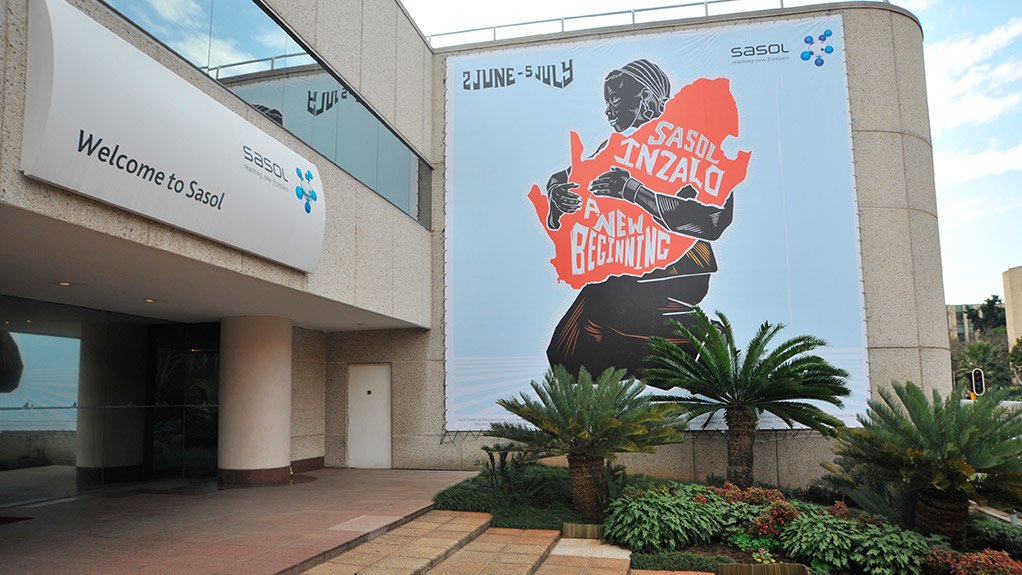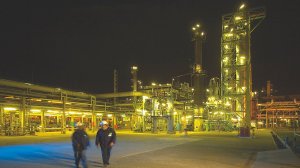Realignment of operational focus and practices drives success


Sasol president and CEO David Constable discusses the state of Sasol's operations at the company's financial results announcement function, in Johannesburg
HOMEGROUND In South Africa, Sasol is an active partner with government in driving socioeconomic transformation and nation building
Last month, South African energy and chemicals group Sasol highlighted at its full-year financial results briefing for the year ended June 30 that the organisation intended to continue improving operational efficiencies in line with its groupwide change programme.
Speaking at the company’s head offices in Rosebank, Johannesburg, president and CEO David Constable said that, during the 2014 financial year, the organisation posted all-round “outstanding” performances against its financial and operational targets.
The group reported an operating profit of R41.7-billion on revenue of R202.7-billion, which it attributed to better-than-expected operational results, the weaker rand and an improvement in global chemicals prices.
“However, while it is true that macroeconomics continue to support our financial results, the company’s overall achievements are largely attributable to effectively managing the factors within our control through informed and measured management interventions,” noted Constable.
He pointed out that, during the 2014 financial year, these factors included increasing volume growth, embedding comprehensive organisational changes and continuously improving the organisation’s business and operational performance.
“In turn, these focused interventions support Sasol’s overarching definition of victory, which is to grow shareholder value sustainably,” Constable stated.
Towards a New Era
Reflecting on the all-encompassing changes that Sasol had implemented over the past three years, Constable explained that, at the end of 2011, Sasol’s management team saw the need to sustain the company’s strong operational and financial performances through the implementation of its groupwide change programme.
Therefore, in 2012, Sasol’s management team started to reposition the organisation by driving a single set of priorities across the group “with safe, stable and efficient operational practices at the core”.
Further, to ensure greater focus across the organisation, management prioritised the company’s project portfolio during 2013, which included a “clear articulation” of Sasol’s near- to medium-term strategy, further including two key regions – Southern Africa and North America.
“In parallel, from 2012 to 2014, we restructured the group and introduced changes to our top and senior management layers and corporate structures to cement our longer-term strategic direction,” said Constable.
Further, he explained that these changes culminated in the roll-out of the organisation’s new operating model implemented on July 1, which included revised structures and processes.
“During this period of repositioning, Sasol moved away from coal-to-liquids opportunities in China, Indonesia and India, primarily in favour of gas-based projects in Southern Africa and North America,” Constable highlighted.
Local Contribution
Constable stressed that, in repositioning Sasol for a new era, a key feature of its licence to operate was the broader contribution that the group made to society.
He noted that, in South Africa, Sasol was an active partner of government in driving socio- economic transformation and nation building. Sasol’s corporate strategies in the Southern African region – basic education and skills development, infrastructure expansion, and security of energy and petrochemical supply – which all contribute to job creation and economic development, were strongly aligned with the country’s National Development Plan, Constable explained.
He highlighted that its local capital expenditure in the 2014 financial year was R22-billion, which equated to 57% of the group’s total spend.
Further, Constable noted that, for the past three years, Sasol had invested R60-billion in capital investments in South Africa, and it remained the single largest private-company investor in South Africa.
He noted that Sasol continued to create construction jobs for tens of thousands of semiskilled and unskilled artisans and workers. Constable highlighted that, at the company’s Secunda and Sasolburg sites, in Mpumalanga and the Free State respectively, 12 500 construction jobs and 29 000 shutdown employment opportunities were created in the 2014 financial year.
He said Sasol remained the largest corporate taxpayer in South Africa, contributing R36-billion in direct and indirect taxes to the fiscus in the 2014 financial year, and R95-billion over the past three years.
“In parallel, Sasol is investing hundreds of millions of rands in bursaries, skills development initiatives, artisan learnerships and continuous tertiary education. Through targeted interventions, our global investment in skills and socioeconomic development was more than R1.4-billion this year and more than R3-billion for the past three years,” Constable emphasised.
Synthetic Fuels Focus
Constable pointed out that Sasol’s ongoing efforts to improve its operational efficiencies had resulted in the group’s Synfuels complex, in Secunda, producing 7.6-million tons in the 2014 financial year, up 2% from the 7.1-million tons it produced in 2011.
He noted that this was the highest level of production that the facility had achieved in the past ten years.
Sasol’s synthetic fuels operations produce a range of products, such as fuel components for the manufacture of automotive fuels, aviation jet fuel, illuminating paraffin, liquefied petroleum gas and ammonia.
Its operations also produce carbon products, which comprise green and calcined pitch; hybrid and waxy oil cokes; feedstock for the manufacture of ethylene, propylene, hexene, pentene, octene, detergent alcohols, phenol, solvents, krypton and xenon mixtures; methane-rich gas; and heavy refinery fuels for the manufacture of fuel oils, sodium sulphate and sulphur, as well as wet sulphuric acid.
Article Enquiry
Email Article
Save Article
Feedback
To advertise email advertising@creamermedia.co.za or click here
Announcements
What's On
Subscribe to improve your user experience...
Option 1 (equivalent of R125 a month):
Receive a weekly copy of Creamer Media's Engineering News & Mining Weekly magazine
(print copy for those in South Africa and e-magazine for those outside of South Africa)
Receive daily email newsletters
Access to full search results
Access archive of magazine back copies
Access to Projects in Progress
Access to ONE Research Report of your choice in PDF format
Option 2 (equivalent of R375 a month):
All benefits from Option 1
PLUS
Access to Creamer Media's Research Channel Africa for ALL Research Reports, in PDF format, on various industrial and mining sectors
including Electricity; Water; Energy Transition; Hydrogen; Roads, Rail and Ports; Coal; Gold; Platinum; Battery Metals; etc.
Already a subscriber?
Forgotten your password?
Receive weekly copy of Creamer Media's Engineering News & Mining Weekly magazine (print copy for those in South Africa and e-magazine for those outside of South Africa)
➕
Recieve daily email newsletters
➕
Access to full search results
➕
Access archive of magazine back copies
➕
Access to Projects in Progress
➕
Access to ONE Research Report of your choice in PDF format
RESEARCH CHANNEL AFRICA
R4500 (equivalent of R375 a month)
SUBSCRIBEAll benefits from Option 1
➕
Access to Creamer Media's Research Channel Africa for ALL Research Reports on various industrial and mining sectors, in PDF format, including on:
Electricity
➕
Water
➕
Energy Transition
➕
Hydrogen
➕
Roads, Rail and Ports
➕
Coal
➕
Gold
➕
Platinum
➕
Battery Metals
➕
etc.
Receive all benefits from Option 1 or Option 2 delivered to numerous people at your company
➕
Multiple User names and Passwords for simultaneous log-ins
➕
Intranet integration access to all in your organisation




















